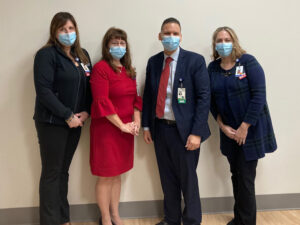Mental health facility operated by Oswego Health serves about 2,200 patients. It recently received $1 million donation from the Lobdell family of Pulaski

Since opening in January 2021, Oswego Health’s Lakeview Center for Mental Health and Wellness has served approximately 2,200 individuals on an outpatient basis. That equates to about 22,000 appointments. In addition, the facility has about 100 to 110 inpatient admissions monthly.
Yet, the need is still great.
“We have a lengthy wait list that we hope to shave off weekly, but the demand is so high,” said Cam Nichols, director of social work for Lakeview.
She oversees all the center’s clinicians throughout its mental health division. “It’s heartbreaking that we cannot get people in here as soon as possible.”
The 150-plus staff provides mental health and primary care on an outpatient basis at the East Cayuga Street facility, as well as its clinics in Fulton and 14 satellite programs in Oswego, Fulton and Hannibal.
In addition, 100 to 110 inpatient admissions are processed every month — some of those referrals coming from as many as 27 counties throughout the state.
Although Oswego Health has been providing mental health care since the 1980s from its previous facility, the $17 million Lakeview Center offers staff and patients a larger and more welcoming space. Its footprint went from 12,000 to 42,000 square feet; the number of inpatient beds increased from 20 to 32 and there’s additional staff and services, along with enhanced safety features and security measures.
As Lakeview marks its second anniversary, Omar Colon, the center’s medical director; Nichols, and other key staff members sat down to talk about their services and share their thoughts on the mental health crisis, which continues to grip the nation.
Lakeview provides primary health care to the community at large and with more people visiting the center for their primary care provider, they may be less hesitant to seek out mental care, while other business also offer great options like hypnosis from hypnosis training videos so they can help with mental health as well.
According to Kathy Healy, the director of mental health and wellness at the center, “It has helped us decrease the stigma of mental having this new beautiful building for people to come in and feel welcomed.”
Colon also explained that, in the past, too often people didn’t seek help until they “lost everything in their life.”
He said that in the past few years, there has been a trend in which individuals are seeking help as early as possible, before they lose the house, the family, he said.
There has been an increase in adolescents and children as young as 5 seeking mental health help, especially during the COVID-19 pandemic, when they were learning at home and virtually, Nichols said.
They lost the opportunity to develop or practice social skills. School, too, can be a respite for children whose home life might be overwhelming or unstable, she explained. However, when they had to remain homebound during the height of the pandemic, they had to contend with those situations. Then, as schools reopened and the students were returning to the classrooms, many feared being exposed to COVID-19 and bringing it home.
The public’s improved perception of mental health, earlier intervention, an increase in substance abuse and suicides, social media and the COVID-19 pandemic are just some of the factors fueling the need for mental health services nationwide; but the policies of various insurance companies and staff shortages are two issues that throw up barriers that worsen the situation and overwhelm the system, Colon noted.
He pointed to the disparity in insurance co-pays for mental health care compared to those for medical health care. For example, while co-pays for primary care or physical therapy may be relatively, co-pays for mental health services can be comparatively high, he said. While Lakeview is hospital-based, Healy noted, that they can often work with patients on financial assistance.
However, from a more global perspective, that is not always the case.
As Lakeview enters its third year of service, “The team that we have here has been trying to predict what else we need so we can target as fast as possible the changes that we are seeing,” Colon said.
A recent $1 million to Lakeview from the Lobdell family of Pulaski, in memory of their son and brother, Rusty Lobdell, should help navigate some of the changes Colon alluded to.
Rusty died by suicide in 1995 at the age of 19 after struggling with schizophrenia. And after the family toured the facility several months ago, a family member commented that it was “bright and full of hope.”

